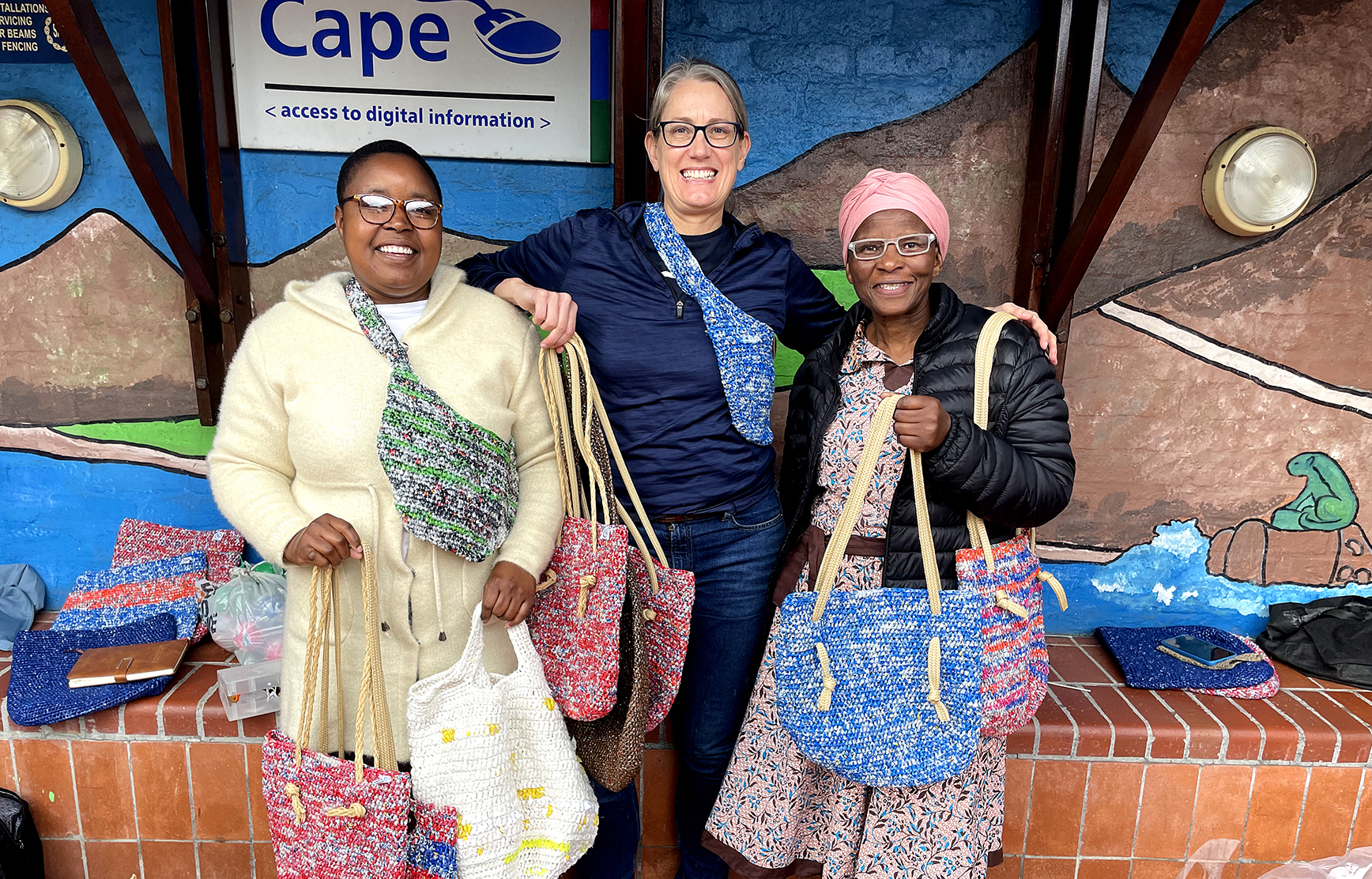What started during the Covid crisis as a spontaneous idea has evolved into a nationwide movement. In 2020, Regine le Roux noticed plastic litter on her jogs and recalled an old craft of weaving mats from plastic bags. Motivated by the loss of jobs and rising unemployment, she launched Re.Bag.Re.Use, inviting women to crochet and cut recycled bread bags into shopping bags, key holders and more.
“It is about seeing potential where others see waste. Turning something headed for landfill into something people love and use. That is the magic of Re.Bag.Re.Use; making something out of nothing,” said Le Roux, the founder of Re.Bag.Re.Use, capturing the spirit of the women-led initiative that is redefining waste through creativity and care.
“If you start to hand (things) out, you take away from someone’s dignity. You have to encourage people to make their own income; it does not matter how big or small,” Le Roux added.
The recycling economy
The project has grown from the seaside suburb of Hout Bay to Mpumalanga, where crocheter Maggie Rabbiea juggles cleaning work with crafting products cut by her daughter, Jacqueline Morake.
“I love being able to use my creativity to earn a little extra for my family,” says Rabbiea. Morake added that, as a new mom, the money helps with groceries and baby essentials.
/file/dailymaverick/wp-content/uploads/2025/08/IMG_6009.jpg)
This personal impact reflects a broader economic reality: the recycling sector remains a crucial source of employment and income, especially in the informal economy.
According to the Plastics SA 2023 report, the informal collection industry contributed more than R4.7-billion in 2023 by gathering more than 671,200 tonnes of recyclable materials. This income flows not only to waste pickers but also to buy-back centres and collectors who supply recyclers with material for reprocessing.
At the heart of this vibrant economy, the Re.Bag.Re.Use team has repurposed more than 144,000 bread bags –equivalent to the weight of eight baby elephants – saved from landfill since the project’s inception. Blue Ribbon, the bread brand whose bags supply the plastic, has sponsored tutorials and supports the initiative’s market exposure.
/file/dailymaverick/wp-content/uploads/2025/08/IMG_6038.jpg)
Community-driven
This success is backed by a wider chain of education and community effort. According to Jenelle Bosman, senior brand manager for Blue Ribbon, the company runs several initiatives, including the Packets of Goodness programme, which visits schools in key communities to teach pupils how to recycle plastic bread bags properly.
Pupils are encouraged to collect the bags and bring them to school, where dedicated representatives from Blue Ribbon’s collection sites across South Africa harvest them. These collected bags are then donated to Re.Bag.Re.Use for recycling and transformation.
How it works
Upon receiving the donated bread bags, Le Roux and her team of cutters meticulously slice the plastic into strips of about 1cm wide. These are then joined into long strands and rolled into compact spools. Each spool represents the recycled equivalent of 10 bread bags.
The plastic rolls then become the raw material for a variety of custom orders, from shopping bags to key holders. Beyond selling finished products, Re.Bag.Re.Use also offers start-up kits that include crocheting tools, along with more than six rolls of recycled plastic, empowering new crafters to join the initiative.
/file/dailymaverick/wp-content/uploads/2025/08/IMG_6026.jpg)
/file/dailymaverick/wp-content/uploads/2025/08/IMG_6021.jpg)
Hooked on healing
The women based in Hout Bay typically gather every two weeks to collect new materials, discuss new projects or orders and spend an hour crocheting together – a practice they describe as “therapeutic.”
“The angrier you are, the tighter the stitch will be,” they say, explaining how the craft offers a meaningful way to channel emotions.
According to Le Roux, crocheting is also a form of self-expression. Each person’s stitch is like a unique fingerprint – while the pattern may be the same, everyone’s individual style creates a special code that helps them distinguish their work from others.
The attention to detail and sustainability extend throughout the project. Even the branding materials for Re.Bag.Re.Use are made from recycled T-shirts, repurposed and printed as a brand tag which is sewn into each product the team produces. Their innovation extends further, with some bags crafted from old cassette tapes.
“Any clean plastic is welcome,” said Le Roux.
What this means
- Supporting recycling projects creates jobs and income opportunities in communities that need it most.
- Buying products made from recycled materials helps reduce plastic waste and landfill pressure.
- Your next plastic bag could be an opportunity to create art or support local recyclers.
- By choosing recycled and locally made goods, you contribute to a more sustainable and inclusive economy.
Bosman said the organisation aligns with Blue Ribbon’s values and “what makes this project so powerful is that it doesn’t only address environmental issues; it also contributes to job creation and supports livelihoods”. DM
Click here to read more business articles.





 From left: Re.Bag.Re.Use founder Regine le Roux flanked by crocheters Sivile Ndlovu (left) and Joana Mnisi. (Photo: Lisakanya Venna)
From left: Re.Bag.Re.Use founder Regine le Roux flanked by crocheters Sivile Ndlovu (left) and Joana Mnisi. (Photo: Lisakanya Venna)